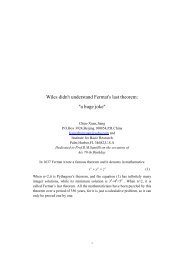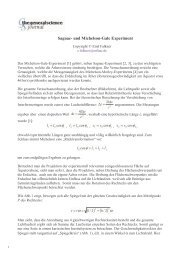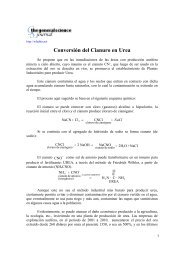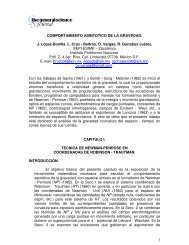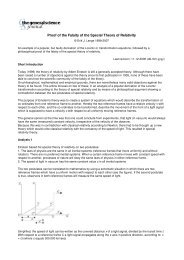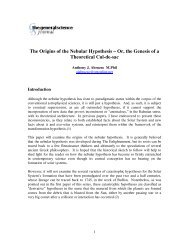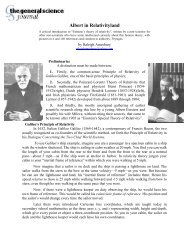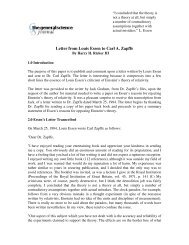MAGNETISM DURING THE SEVENTEENTH CENTURY HH Ricker III
MAGNETISM DURING THE SEVENTEENTH CENTURY HH Ricker III
MAGNETISM DURING THE SEVENTEENTH CENTURY HH Ricker III
You also want an ePaper? Increase the reach of your titles
YUMPU automatically turns print PDFs into web optimized ePapers that Google loves.
“the sphere of their activity was found to be sometimes greater and sometimes less, to a<br />
considerable difference, in ten good stones employed to this purpose.” 28<br />
In 1669, Boyle published the results of additional experiments, performed with the vacuum<br />
pump, designed to test the Cartesian theory of magnetic attraction for iron. The results did not<br />
verify that the air played a role in the attraction. When a load of iron was suspended from a<br />
magnet placed inside the receiver of the pump, evacuation of the air showed no effect. The force<br />
of attraction remained unchanged. This was clearly contrary to the Cartesian theory which held<br />
that the attractive action resulted form the pressure of the air forcing the iron and magnet towards<br />
each other. Boyle also tested whether air played a role in the attraction of two different magnets<br />
by placing them under water, with the result that no measurable difference was noticed.<br />
These results were clearly damaging to the Cartesian magnetic theory, but this was not the<br />
interpretation of the English mechanical philosophers. Although the results of Boyle’s<br />
experiment failed to conform with the expectations derived from the Cartesian theories, the<br />
conclusion which Boyle and the mechanists reached did not reject that theory. The result was an<br />
interesting controversy over the effectiveness of the experiment, showing the tenuous nature of<br />
experimental method. Thomas Hobbes explained the result by claiming that Boyle's apparatus<br />
was a fraud, the experimental failure was a “manifest sign” that Boyle’s air pump did not pump<br />
air, as he claimed. The ensuing controversy obscured the fact that the Cartesian theory had been<br />
disproved.<br />
The failure of the English experimentalists to detect the existence of the magnetic effluvia, did<br />
not prevent them from pursuing the effort. In 1673, Boyle returned to this goal by a new<br />
experimental test. He conceived of the idea that the harshest condition that he could impose upon<br />
the passage of magnetic effluvia was to “cause some needles to be Hermetically sealed up in<br />
glass-pipes” because “Glass is as close as any body is”. Boyle’s expectation was that the glass<br />
would block the passage of the magnetic particles. But, this was not the result, because the<br />
magnetic needles performed the same as if they were not enclosed in glass. But, this did not<br />
disprove the Cartesian explanation of magnetism. Boyle interpreted the result as confirming “the<br />
Strange Subtility, Determinate Nature, and Great Efficacy of Effluviums.” By this time the<br />
English commitment to the paradigm of a mechanistic natural science was so strong that no<br />
experimental evidence was sufficiently strong to deflect them from a belief in it.<br />
In 1674, Sir William Petty presented a paper before the Royal Society on the 26 of November<br />
with the title: “Concerning the use of duplicate proportion in sundry important particulars;<br />
together with a new hypothesis of springing or elastic motions.”This paper is of interest because<br />
it appears to anticipate the modern idea of magnetic moment of atoms or elementary particles. 30<br />
Martin Lister’s Gilbertian Origin of Fossils<br />
Martin Lister was a York physician who made important contributions to the science of biology.<br />
He was originally interested in natural history but later turned to the study of fossils. A Fellow of<br />
the Royal Society, Lister became interested in the formation of minerals, and during the decade



